How Come Boys Get to Keep Their Noses?
GENDER AND CULTURE
GENDER AND CULTURE
A SERIES OF COLUMBIA UNIVERSITY PRESS
Nancy K. Miller and Victoria Rosner, Series Editors
Carolyn G. Heilbrun (19262003) and Nancy K. Miller, Founding Editors
In Doras Case: Freud, Hysteria, Feminism
Edited by Charles Bernheimer and Claire Kahane
Breaking the Chain: Women, Theory, and French Realist Fiction
Naomi Schor
Between Men: English Literature and Male Homosocial Desire
Eve Kosofsky Sedgwick
Romantic Imprisonment: Women and Other Glorified Outcasts
Nina Auerbach
The Poetics of Gender
Edited by Nancy K. Miller
Reading Woman: Essays in Feminist Criticism
Mary Jacobus
Honey-Mad Women: Emancipatory Strategies in Womens Writing
Patricia Yaeger
Subject to Change: Reading Feminist Writing
Nancy K. Miller
Thinking Through the Body
Jane Gallop
For a complete list of titles in this series see
Columbia University Press
Publishers Since 1893
New York Chichester, West Sussex
cup.columbia.edu
Copyright 2016 Columbia University Press
All rights reserved
E-ISBN 978-0-231-54078-0
Library of Congress Cataloging-in-Publication Data
Names: Oksman, Tahneer.
Title: How come boys get to keep their noses? : women and Jewish American identity in contemporary graphic memoirs / Tahneer Oksman.
Description: New York : Columbia University Press, [2016] |
Series: Gender and culture | Includes bibliographical references and index.
Identifiers: LCCN 2015017794| ISBN 9780231172745 (cloth : alk. paper) | ISBN 9780231172752 (pbk. : alk. paper) | ISBN 9780231540780 (e-book)
Subjects: LCSH: Graphic novelsHistory and criticism. | Jewish women in literature. | Autobiography in literature. | JewsUnited StatesIdentity. | American literatureWomen authorsHistory and criticism. | Comic books, strips, etc.History and criticism. | Women in literature.
Classification: LCC PN6714 .O38 2016 | DDC 741.5/973dc23
LC record available at http://lccn.loc.gov/2015017794
A Columbia University Press E-book.
CUP would be pleased to hear about your reading experience with this e-book at .
Cover illustration: Lauren Weinstein
Author illustration, title page: Liana Finck
Book design: Lisa Hamm
References to websites (URLs) were accurate at the time of writing. Neither the author nor Columbia University Press is responsible for URLs that may have expired or changed since the manuscript was prepared.
For Jonathan
Everyone, real or invented, deserves the open destiny of life.
Grace Paley, A Conversation with My Father
How do you know anything about your own historymost of all the history of your subjectivity, and the part that images have played in its construction?
Jo Spence, The Walking Wounded?
The Jewish mindset has driven me crazy my whole life.
Vanessa Davis, In search of the whole truth
My own nose, which, surely, is, for all intents and purposes, myself?
Nikolai Gogol, The Nose
I always start with the nose, thats all I know.
Aline Kominsky Crumb, Public Conversation
Contents
 his book is the product of years of conversations and interactions with colleagues and friends, and it was inspired by countless works of scholarship, literature, and art, which I have made every attempt to acknowledge throughout the text.
his book is the product of years of conversations and interactions with colleagues and friends, and it was inspired by countless works of scholarship, literature, and art, which I have made every attempt to acknowledge throughout the text.The project would not have been possible without the continued and unwavering support of Nancy K. Miller, who motivated me to write about what I loved and offered her enthusiasm, encouragement, and incisive critique at every step. There are no suitable words to express my gratitude. Hillary Chute provided me with invaluable guidance, mentoring, and friendship and enthusiastically told me from the beginning that if I wrote the book she would read it. I am thankful to her for paving the way. My agent, Cecelia Cancellaro, believed in this project, helped me shape it, and found it a home. I am delighted to be part of the Gender and Culture series at Columbia University Press and thankful to its editors, Nancy and Victoria Rosner. Also at CUP, thanks especially to Jennifer Crewe, Lisa Hamm, Susan Pensak, and Kathryn Schell for their careful and discerning input, insights, and attention to detail.
Many other colleagues and friends were patient enough to read through versions of my chapters, help me work out my ideas from the early to late stages of writing, or just provide me with a precious support network. In addition to two anonymous readers at CUP who gave me indispensable comments, I am thankful to Laurel Harris, Seamus OMalley, and Yevgenia Traps for feedback on various chapters. Magda Maczynska and Jennifer Mitchell gave me last-minute advice on the introduction. Nancy read through the whole manuscript and provided her usual unparalleled feedback, and Hillary, Wayne Koestenbaum, and Sondra Perl also read the full manuscript in its early stages and provided indispensible comments that helped shape it.
A number of cartoonists fielded my questions and offered me insights that have enriched the way I read and write about comics. I am thankful for inspiring conversations with Gabrielle Bell, Vanessa Davis, Sarah Glidden, Miriam Katin, Keren Katz, Miss Lasko-Gross, Miriam Libicki, Maurice Oksman, Anya Ulinich, and Lauren Weinstein. Liana Fincks way of seeing the world has transformed mine, and I delight in our new friendship.

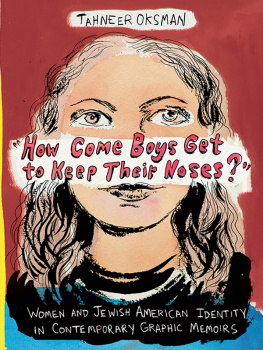
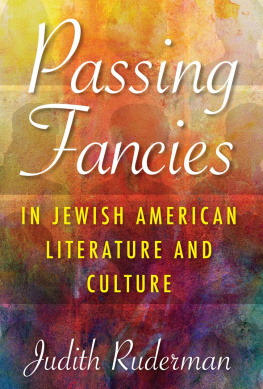


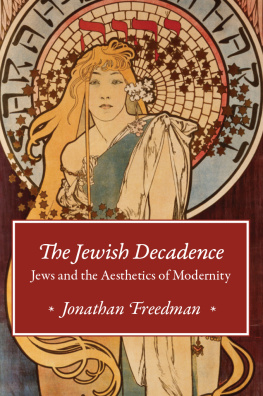

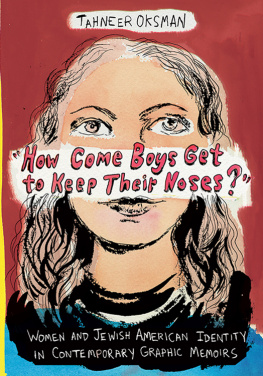
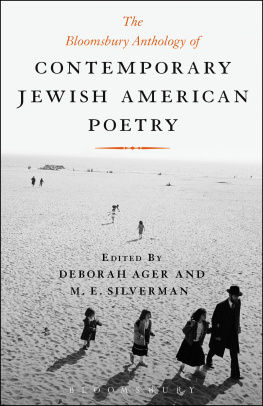




 his book is the product of years of conversations and interactions with colleagues and friends, and it was inspired by countless works of scholarship, literature, and art, which I have made every attempt to acknowledge throughout the text.
his book is the product of years of conversations and interactions with colleagues and friends, and it was inspired by countless works of scholarship, literature, and art, which I have made every attempt to acknowledge throughout the text.